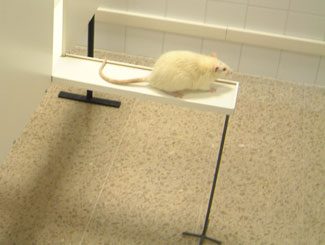Rats with more siblings are less anxious in their adulthood

The first years of life are very important for the development of central nervous system and behavior at adulthood. Due to the technical difficulties in humans to perform some kind of experiments, animal models in rodents are very useful for the study of early life experiences upon behavior at adulthood.
As the majority of mammals, rats and mice life with the mother and the rest of pups of the same litter from birth to weaning (approx. at 21 days old) and from this point the pups are able to feed by themselves. During this phase, several very important experiences have to be considered, such as maternal behavior to the pups and the relationships between all the pups of the same litter. Several studies already have shown that pups that have received less attention from the mother presented as adults an anxious behavior and a higher hormonal reactivity in front of stressful situations. On the other hand, some mothers have fewer pups in a given litter and other mothers have more pups, although the role of the number of pups in emotional behavior at adulthood has not been extensively studied.
In our experiment, we studied the adult behavior of male rats differing in the number of brothers/sisters: in the first group were included litters with less than 10 pups, in the other group litters from 10 to 15 pups, and in the third group litters with more than 15 pups. Moreover, we studied maternal behavior to these pups, to ascertain its role in emotional changes at adulthood. Our results showed that pups from small litters behave in a more anxious way when adults, presented less exploratory behavior in novel environments and a more passive behavior in front of stressful situations, in comparison to bigger litters.
However, rats from small litters received more maternal care individually, which has been previously related to less anxiety at adulthood. Thus, in addition to maternal behavior, other factors such as the relationship between brothers/sisters could have important consequences at adulthood, giving more validity to the animal model.
References
"Litter size affects emotionality in adult male rats" Dimitsantos, E; Escorihuela, RM; Fuentes, S; Armario, A; Nadal, R. PHYSIOLOGY & BEHAVIOR, 92 (4): 708-716 NOV 23 2007

